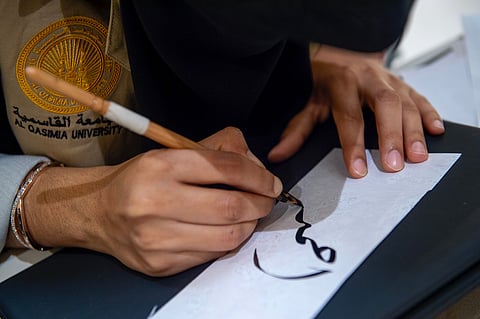Stories, systems, and scrolls: Sharjah libraries celebrate 100 years with a cultural journey
SPL centennial event explores governance and literature in Islamic civilisation

Sharjah: As part of its centennial celebrations, the Sharjah Public Libraries (SPL) organised a panel discussion titled "The Cultural Mission" at the Holy Quran Academy in Sharjah.
Held in collaboration with the Holy Quran Academy and Al Qasimia University, the event was attended by Dr. Abdullah Khalaf Al Hosani, Secretary-General of the Holy Qur’an Academy, along with a distinguished group of academics, intellectuals, and university students.
The session featured Dr. Nasser Al Falasi, Assistant Professor in the History Department at Zayed University, and Dr. Abdul Hakim Al Anis, Scientific Expert at the Holy Quran Academy. The discussion was moderated by Dr. Rashid Al Naqbi. It formed part of SPL’s broader efforts to revive Arab and Islamic knowledge traditions and reinforce the role of libraries as essential cultural and intellectual institutions.
Governance in Islamic civilisation
Dr. Nasser Al Falasi explored the evolution of governance in Islamic civilization, emphasising how a historian’s perspective shapes the interpretation of history. He argued that the Islamic financial system was key to the prosperity of the Islamic state and criticised the reliance of some Orientalist scholars on Roman and Western sources, which, he said, led to misinterpretations — particularly concerning Islamic taxation, such as the jizya.
He contrasted Islamic and Roman financial systems, noting that Islamic taxes were significantly lighter. For instance, annual tax rates under Islamic governance were lower and more equitable, with exemptions for women, children, and the elderly. Unlike the Roman model, the Islamic system protected non-Muslims without requiring military service.
Dr. Al Falasi pointed out that some Western historians have recognised the jizya as a sophisticated structure that supported public welfare and enabled non-Muslim communities to thrive. He also highlighted the Islamic approach’s adaptability, which accounted for distance, hardship, and agricultural conditions, taxing only cultivated land.
He concluded with the discovery of early Islamic tax records from the second century Hijri, later compiled by a British historian. These documents offer rare insights into the practical functioning of early Islamic fiscal systems.
Wit and wisdom in Arab literary heritage
Dr. Abdul Hakim Al Anis presented a paper on the wit and depth of Arab literary heritage, showcasing the intellectual vitality of Islamic civilisation. He noted that Arab scholars produced a wide range of works — spanning science, art, philosophy, and daily life — many of which are now housed in leading libraries worldwide.
He shared examples of unconventional texts, including personal reflections on hunger and grief, historical narratives, and writings that captured the final moments of notable figures. These texts, he said, reveal that Arab scholars addressed themes often considered modern centuries ago.
Dr. Al Anis also discussed humorous and practical literature on topics such as health, aging, and social etiquette. Many of these works are seeing renewed interest in contemporary academic studies, reflecting the enduring relevance of Islamic intellectual contributions.
He concluded by emphasising that topics like emotional well-being and interpersonal conduct — central to modern discourse — were deeply explored by early Arab thinkers, offering insights that continue to resonate today.
Celebrating Islamic arts
The event also featured a workshop on Arabic calligraphy and Islamic ornamentation, giving participants the chance to engage with the beauty and legacy of Islamic arts. The integrated setting bridged intellectual thought with artistic creativity, rounding out a day dedicated to cultural and scholarly enrichment.



